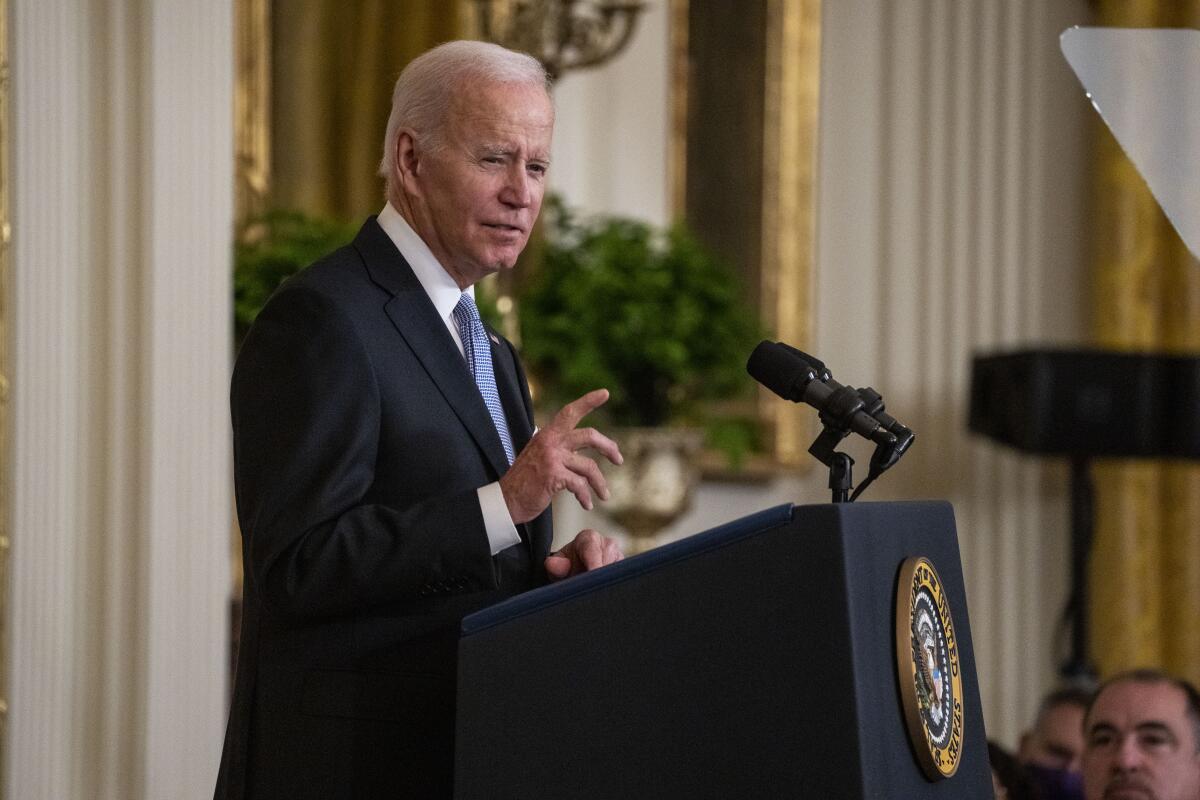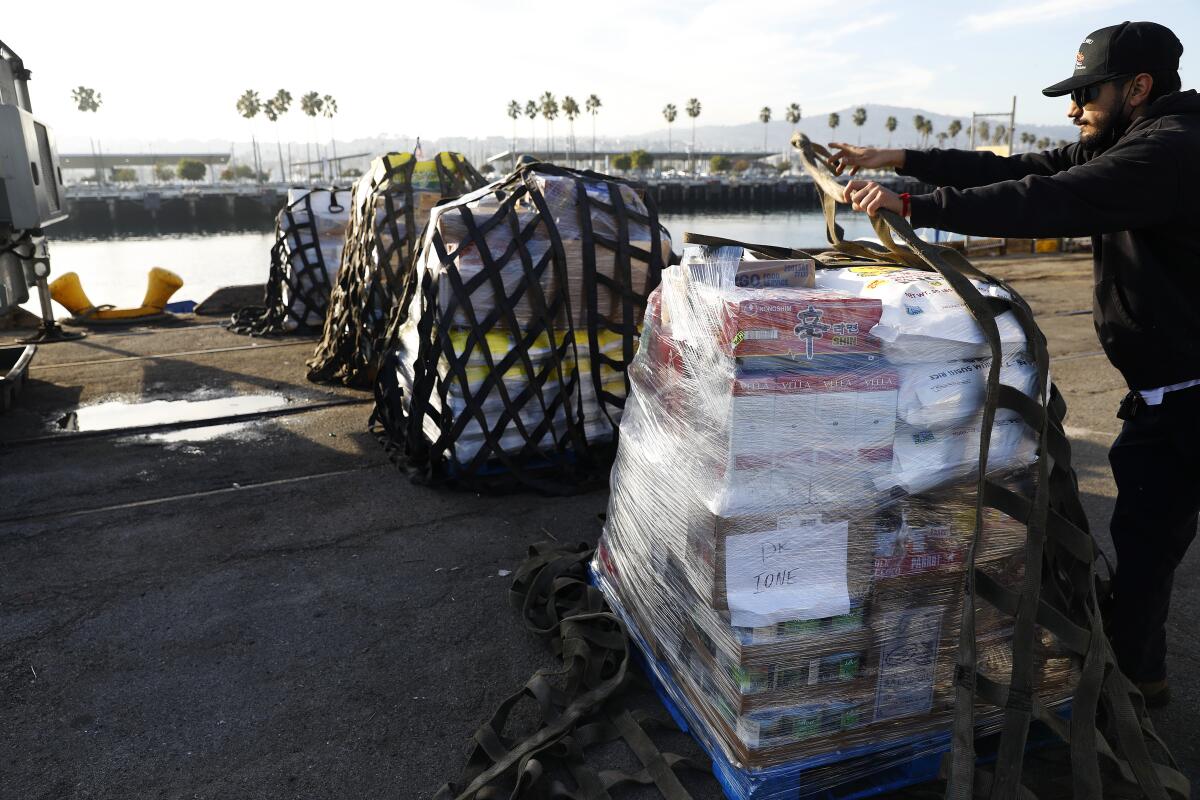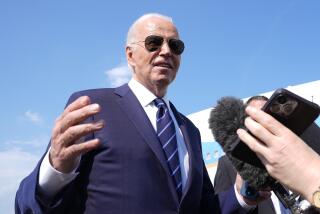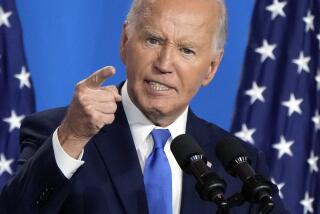News Analysis: Biden, who ran on competency and experience, is struggling to manage multiple crises

- Share via
WASHINGTON — President Biden’s virtual meeting Wednesday with industry executives in the South Court Auditorium, a soundstage in the hulking office building adjacent to the White House, was held to highlight the administration’s response to the ongoing infant formula shortage.
But it backfired. The scripted event ended up highlighting just how slow the White House was to recognize the problem and underscoring persistent questions about how such a veteran administration has mismanaged major crises, not to mention the president’s public appearances.
Whether it is the last-minute scramble to avoid a diplomatically embarrassing boycott at next week’s Summit of the Americas in Los Angeles or its faulty projections about inflation and struggles to control rising costs, the administration’s rocky responses to various challenges have given rise to new doubts about Biden’s promise to restore competency and stability to government.
The White House has been working to rebuild its credibility for nearly a year, ever since the botched U.S. withdrawal from Afghanistan shattered the public’s confidence in Biden. But a relentless pandemic, the influx of migrants at the southern border and the president’s stalled legislative agenda have served to further calcify the public’s negative perceptions.
The trouble with the meeting Wednesday with infant formula company executives started when Biden said he didn’t “think anyone anticipated the impact of the shutdown of one facility.” He then had to concede that the executives had just said they realized the potential for supply issues in February when Abbott shut its Michigan plant.
“They did, but I didn’t,” Biden said, betraying his frustration that the crisis, which the Food and Drug Administration reacted to immediately, wasn’t escalated to him until April — a glaring communication breakdown.

The administration’s effort to address the shortage, “Operation Fly Formula,” involves transporting millions of bottles of formula from other countries to the U.S., although the shipments won’t be on store shelves for another few weeks.
“You can’t control the hand you’re dealt, and this is one of the worst hands any president has ever been dealt,” said Chris Whipple, the author of a book on White House chiefs of staff and another on the Biden administration to be published later this year. The formula shortage, he continued, “is really a political problem because he took a real hit with the Afghanistan withdrawal, and this is not helping.”
“Only the toughest decisions get to the Oval Office, and they don’t always get there that quickly,” Whipple said. “I don’t blame Biden for not knowing sooner. Somebody should have told him sooner. But he owns it, because it’s happening on his watch.”
The president’s approval rating still hasn’t recovered from the rough exit from Afghanistan. And nearly 10 months later, with Democrats’ slim congressional majorities in jeopardy this November, questions of competency persist as the White House is working strenuously to address domestic concerns about inflation and public health while managing a plethora of foreign policy complications, including Russia’s invasion of Ukraine.
“Voters expected the world would calm down when Biden became president, that the chaos would be replaced with competence. If you look at the last year and a half, the world is still upside down,” said Peter Hart, a Democratic pollster in Washington. “Trump’s chaos was personal chaos. This is mostly world chaos. But [Biden’s] ratings are low, and there’s not a sense that this is an administration in command. They’re a reactive administration instead of a proactive administration.”
With Russia’s war in Ukraine, last month’s Asia trip and the upcoming Group of 7 and North Atlantic Treaty Organization summits this month eating up much of the administration’s national security bandwidth, the administration has struggled to finalize its agenda and even the invite list for the Summit of the Americas, a gathering of leaders from around the hemisphere the U.S. will host beginning Monday in Los Angeles. President Andrés Manuel López Obrador of Mexico, a top U.S. trading partner and one of Washington’s biggest allies on curbing migration, has yet to say whether he will attend.

Asked Wednesday about the “eleventh hour” nature of plans for the summit, White House Press Secretary Karine Jean-Pierre laughed off the question, suggesting that last-minute decision-making was standard procedure in the West Wing — even amid a briefing dominated by tough questions about the administration’s response to the infant formula shortage.
“If you’ve been following this administration for the past year and a half, one week is not the eleventh hour when it comes to ... how things move,” she said. “That is a lifetime away for us.”
The administration in recent weeks has begun an effort to demonstrate a clear focus on what is probably the top issue for voters ahead of November’s midterm elections: months of runaway inflation and the exorbitant cost of gasoline and other consumer goods.
But the administration’s messaging blitz has already been complicated by the fact that not everyone is on the same page. Treasury Secretary Janet L. Yellen offered a mea culpa Tuesday during a CNN interview, acknowledging that she had failed to anticipate how long inflation would affect consumers.
“I think I was wrong then about the path that inflation would take,” Yellen said when asked about her 2021 comments — reflective of the administration’s overarching view — that inflation posed only a “small risk.”
Get our L.A. Times Politics newsletter
The latest news, analysis and insights from our politics team.
You may occasionally receive promotional content from the Los Angeles Times.
Just hours earlier, Brian Deese, the president’s top economic advisor, refused to make a similar concession. Speaking to reporters at the White House, he ducked a question about whether he had been wrong to have predicted that inflation would be “transitory.” Instead, he parried, pointing out that inflation, by the persistent supply chain issues arising from the COVID-19 pandemic, was being exacerbated by Russia’s war in Ukraine, which roiled global energy markets.
The White House struggles over inflation messaging dates to the second half of last year, a consequential period that reshaped the public mood about the direction of the country and Biden’s performance as president. Doug Sosnik, former longtime senior advisor to President Clinton, said decisions made during that period may have set the stage for an anticipated Democratic drubbing at the polls this November.
“There were a confluence of events that hit at the same time and changed the zeitgeist of how it’s going, and it’s settled in for half a year now,” Sosnik said.
During those six months, Biden declared victory over the COVID-19 pandemic in July, only for the globe to be clobbered by waves of new virus variants as the country endured shortages of at-home test kits. Thirteen U.S. troops and scores of Afghans were killed during August’s hasty and messy withdrawal from Kabul. His domestic agenda and signature piece of legislation — a sweeping social spending plan — died in December.

Topping off matters, as Americans got ready for the holidays, they were battered by a string of pandemic-fueled supply chain bottlenecks and inventory shortages that sent the inflation rate soaring to more than 6% by October and to a 40-year high, reaching 8% in April.
“From a policy standpoint and certainly from a messaging standpoint, the White House was behind the curve on dealing with inflation and talking about inflation,” Sosnik said. “And that was really a point when people began to take a turn of a more negative view.”
As the White House begins a month of ramped-up messaging aimed at emphasizing the overall strength of the economy and framing inflation as a “global problem,” voters’ minds may already be made up.
In the last four midterm elections, voters had decided by June how they were going to vote in November, Sosnik said. President Trump’s 39% job approval in February 2018, for example, stayed steady through November. The same went for President Obama in his two midterm campaigns.
A senior White House official acknowledged Thursday that the Biden administration’s ability to mitigate inflation in a globalized economy is limited, while insisting that the administration isn’t frustrated, even as it braces for a difficult election cycle.
“I wouldn’t say it’s frustration,” the official said. “Being president is hard, and you have to deal with a lot of difficult stuff.”
More to Read
Get the L.A. Times Politics newsletter
Deeply reported insights into legislation, politics and policy from Sacramento, Washington and beyond. In your inbox three times per week.
You may occasionally receive promotional content from the Los Angeles Times.












